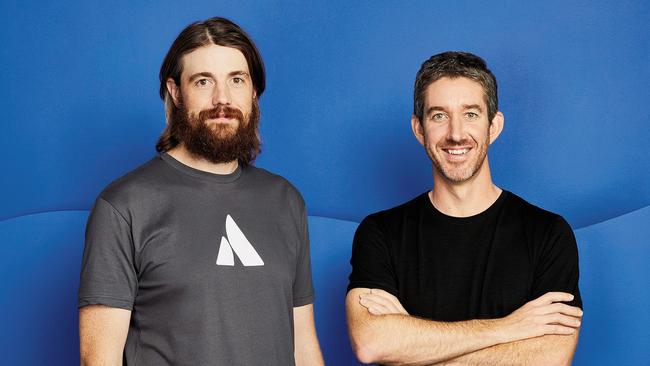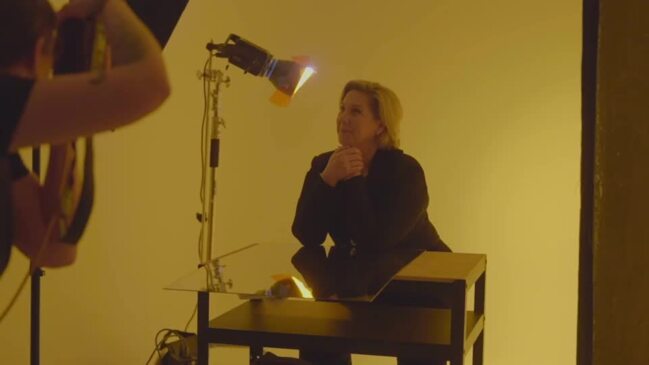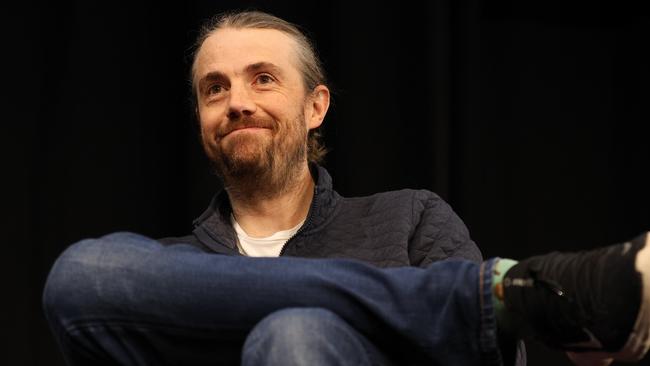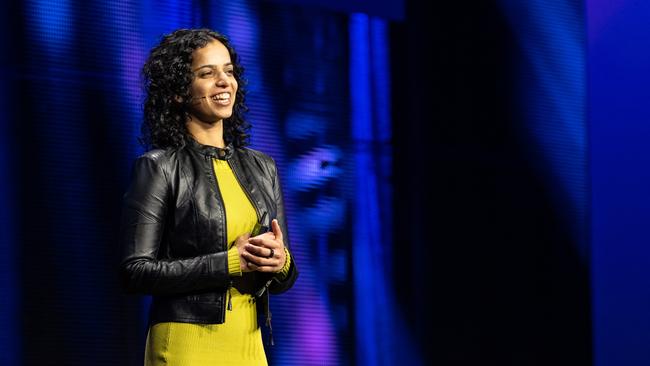AI test is survival of the fittest says Scott Farquar
The rise of generative AI is the tech sector’s ‘iPhone moment’, according to Atlassian boss Scott Farquhar, who predicts an industry-wide upheaval that some won’t survive.

Ever since OpenAI’s ChatGPT went viral in 2022, software companies have been racing to capitalise on interest in generative AI, in which algorithms can create new content and “learn” from data patterns without human direction, promising an exciting new era of innovation and creativity.
While generative AI has sparked a feeding frenzy among startups and investors, broader questions are being asked about how the technology might upend the current crop of technology companies, including Atlassian, which is Australia’s largest enterprise software company, now worth about $US50bn ($77bn).
A gap is beginning to emerge between the companies who remain circumspect about the promise of AI, and those who are racing ahead on AI projects within their own businesses. Atlassian co-founder Scott Farquhar is firmly in the latter camp, detailing Atlassian’s AI plans in a conversation with The List on the sidelines of his company’s Team ’23 event in Las Vegas.
For Farquhar, generative AI is potentially as transformational for businesses as it is for everyday people.
“I think it’s really exciting, it’s like an artist who was using pencils, and suddenly paint comes along.”
“I’ve been through three large market transitions in my career,” Farquhar says. “The first was client server to web, that happened around the dot-com crash in the early 2000s. That was a relatively slow transition. And then we had a mobile decade, led by the iPhone and the App Store, which was amazing. There were relatively few companies that got disrupted in that period of time, until new companies like Uber started taking advantage of it.
“This AI stuff now is happening faster than I’ve ever seen in my career, and I do believe it will change the landscape of how things will happen.”
Some of the current crop of technology companies likely won’t survive AI, Farquhar says, if they don’t adopt the technology or if they try to fight what he sees as its inevitable impact.
“From a personal perspective I think it’s really exciting, it’s like an artist who was using pencils, and suddenly paint comes along. The first things you paint probably aren’t works of art, but over time you start doing different things, getting depth of colour, and using that huge new palette,” he says.
“AI does have its risks but I think every business will need to be working with it, I don’t care if you’re in construction or you’re in healthcare or a legal firm, this is not a tech-industry issue, this is every company.”

This is a feature from The List: 100 Innovators 2023, online and in The Australian on Friday, September 15.
Atlassian is working hard to avoid becoming one of the companies disrupted by AI, unveiling an AI-based “virtual teammate” it says will increase efficiency for the 250,000 customers that use its business software.
The virtual teammate, dubbed Atlassian Intelligence, can be viewed as like having a college graduate to help out with your workload, according to Farquhar. And not just one teammate, but 100 teammates, all pitching in with tasks at infinite speed.
Atlassian’s AI functionality was built in collaboration with ChatGPT maker OpenAI and has been embedded across all of Atlassian’s cloud software products, including Jira, Confluence and Trello, which are used by workers to collaborate and organise workflows. Workers are able to use AI to automatically summarise decisions and action items from meeting minutes, draft tweets based on product specifications, and ask questions such as “how much can I spend on my home office set up?”.
The company’s partnership with OpenAI, which is backed by Microsoft, is an acknowledgement from Atlassian that it’s better off in some instances partnering with existing players rather than trying to build everything itself. Five years ago Atlassian attempted to take on chat software provider Slack with its own competitor, Stride, but shut down those efforts that same year after realising it was too late to be truly competitive.

Atlassian is now two decades old and is walking a tightrope between its relatively new status as a large, mature tech company with one that still has innovation and R&D at its core, and for which the world’s best engineers want to work.
For its co-founder Mike Cannon-Brookes, AI has suffered somewhat of an image problem, and should be thought of as making software more human, not less.
“Do I think large language technologies and more broadly AI will appear everywhere? Yes. But will you necessarily notice it as some sort of creepy sci-fi system that follows you around? I don’t think so,” he says.
“It’s more that the way you will interact with technology will get deeper and more human at each stage.
“I don’t know that we will necessarily have these super assistants that follow us around like a single J.A.R.V.I.S. [Tony Stark’s AI assistant in the Marvel Cinematic Universe’s Iron Man] kind of thing but all the software you interact with will get smarter, often in ways you can’t perceive.”

For Atlassian president Anu Bharadwaj, the tech company is now 20 years into what its executives perceive as a 100-year journey. Atlassian added more than 2000 employees to its team between 2021 and 2022 and needs to act completely differently to those early years when it was a wild idea supported by a $10,000 credit card debt.
Culture changes over time but values don’t, Bharadwaj says.
“For me, personally, I think a lot about what are changes we need to go through as a company, how do we not just survive but thrive? And if you look at us right now, in this moment of time for Atlassian, we are set up in a great place in terms of strategic strength,” she says.
“AI is a net expansionary trend for us across our markets and the collective wisdom of the company has situated as in a really good place competitively as well, so we’re in a position of strength.
“What does need to change and what we do need to adapt to is focusing on executing more efficiently.”
Atlassian enjoyed virtually uninterrupted growth since its founding in 2002, Bharadwaj says, and therefore hasn’t needed to think about efficiency.
That all changed in March when the company laid off 500 workers – about five per cent of its workforce – changes that its executives say were about reprioritisation for roles it no longer needed, rather than a reflection of the company’s financial performance.
Bharadwaj says that along with AI, a new focus on efficiency will help steer Atlassian through its next decade.
“We are a company of builders, right? So we enjoy going after new ideas and building things, and my jobs in my role is to say, ‘That’s amazing that we’re building things, but we’ve got to be very clear about where we draw the line’, and how many things we take it upon ourselves to be doing,” she says.
“I feel like we’ve gone through several phases. But one thing that has definitely felt constant is our values. In fact when I was interviewing with Atlassian, they told me a lot of about their company values, and I thought, ‘Oh every company does this, it’s marketing BS’. But when I came to Sydney with the team what struck me was they’re not just saying this, they’re not just listing them on their website, they’re living it day to day and using the values to set the tone. That became a great implicit, virtuous loop for people to see that if they live the values, they’ll be rewarded.”





To join the conversation, please log in. Don't have an account? Register
Join the conversation, you are commenting as Logout